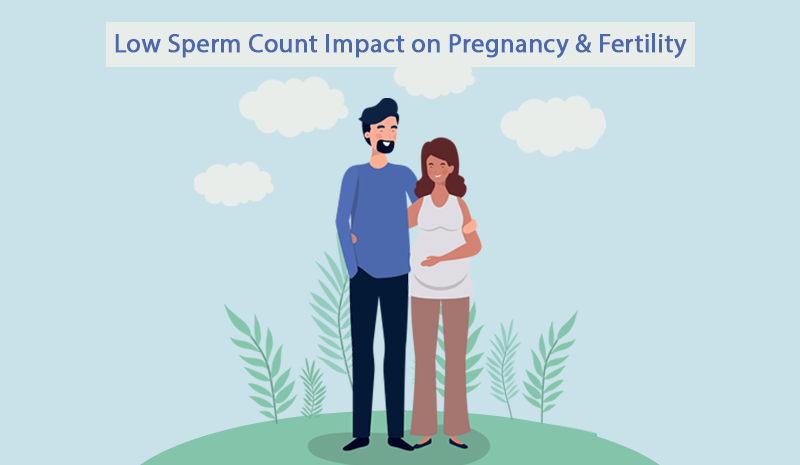Blog > Dissecting Low Sperm Count and its Impact on Pregnancy & More
Dissecting Low Sperm Count and its Impact on Pregnancy & More

Trying to conceive can be an exciting time, but it can also be stressful if pregnancy doesn’t occur as quickly as you’d hoped. While there are many factors influencing fertility, one common concern for couples is the possibility of a low sperm count in the male partner.
This blog post explores how low sperm count impacts pregnancy, infertility, its diagnosis and treatment.
Is low sperm count a problem ?
Sperm count is considered low (oligospermia) when it falls below 15 million sperm per milliliter (mL) of semen.
While sperm count may naturally decline with age, having a low count can impact the chances of getting pregnant naturally. It becomes more prevalent specifically for individuals in their mid-30s and onwards.
However, it’s important to understand that low sperm count doesn’t always lead to infertility.
But what causes low sperm count?
While the exact cause of low sperm count can vary, several common factors contribute:
- Varicocele: This is an enlargement of the veins in the scrotum, which can affect blood flow and temperature regulation, impacting sperm production.
- Undescended testicles: When testicles fail to descend fully from the abdomen into the scrotum during fetal development, it can lead to sperm production issues.
- Hormonal imbalances: Conditions affecting testosterone and other hormones can disrupt sperm production.
- Infections: Infections in the reproductive tract can damage sperms.
- Medical conditions: Certain medical conditions, like chronic illnesses like Diabetes, can affect sperm health.
- Lifestyle factors: Tobacco use, excessive alcohol consumption, drug use, and obesity can all contribute to low sperm count.
- Environmental factors: Exposure to toxins, heavy metals, and certain chemicals can potentially impact sperm health.
What diseases cause low sperm count?
Several diseases can contribute to low sperm count, including:
- Klinefelter syndrome: This chromosomal disorder can cause abnormal testicular development and low sperm production.
- Cystic fibrosis: This genetic condition can block the tubes carrying sperm, leading to infertility.
- Celiac disease: This autoimmune disorder can interfere with nutrient absorption, impacting sperm production.
- Mumps: Orchitis, an inflammation of the testicles caused by mumps, can potentially damage sperm production, although this is less common today due to widespread vaccination.
Does low sperm count cause erectile dysfunction?
While low sperm count and erectile dysfunction (ED) can co-occur, they aren’t directly related. However, some underlying conditions, like hormonal imbalances, can affect both sperm production and erectile function.
Can low sperm count cause multiple miscarriages?
While low sperm count can contribute to difficulty getting pregnant, it’s not directly linked to an increased risk of miscarriage. However, conditions like varicocele (responsible for sperm production, etc.) have been found to negatively affect the DNA of the sperm, thus increasing likelihood of pregnancy loss.

Can low sperm count impact pregnancy and lead to infertility?
Fewer sperm count can be a contributing factor to infertility, but it’s not the sole determinant. It’s important to remember that many couples with low sperm count still conceive naturally, while others may require assistance. In such cases, our various treatment options can significantly improve the chances of successful pregnancy.
So, does low sperm count mean low quality?
Not necessarily. Even with a lower count, some sperm might still be healthy and motile enough for fertilization. As we indicated earlier, quality matters.
Can low sperm count conditions be reversed?
The possibility of reversing a low sperm count depends on the underlying cause. In some cases, lifestyle changes. If a specific medical condition is contributing, treating that can also help.
How do I know if my husband has a low sperm count?
The primary method for diagnosing low sperm count is semen analysis. And you will know that the health of the sperm is not based merely on quantitative features.
This simple test involves collecting a semen sample through masturbation (avoiding it 2-5 days before the test is recommended) and sending it to a laboratory for analysis. The analysis measures various parameters of the semen, including:
- Volume: The total amount of semen produced.
- Sperm count: The number of sperm per millilitre.
- Motility: The percentage of sperm that are moving and their swimming patterns.
- Shape/Structure: The morphology of sperm also plays a role.
Low sperm production treatment:
Several treatment options are available for low sperm count, depending on the cause and severity:
- Lifestyle changes: As mentioned earlier, becoming a non-smoker, reducing alcohol intake, maintaining a healthy weight, and managing stress can positively impact sperm health.
- Medication: Medications like hormonal therapy can address hormonal imbalances affecting sperm production.
- Surgery: Varicocele repair surgery can improve blood flow and potentially increase sperm count.
- Sperm retrieval techniques: In severe cases, sperm retrieval techniques like testicular sperm extraction (TESE) may be used for assisted reproductive technologies like IVF.
Conclusion
So, if you still doubt, could low sperm count be a permanent problem? The answer to this is very simple and non-disappointing. If you underwent a semen analysis test, and it showed low or zero sperm count, it is not equivalent to you being permanently infertile. Generally, the issue lies with the production of sperm or its delivery. However, even in these situations, various fertility treatments can still help couples achieve pregnancy.
Connect with us on Facebook, Instagram and Youtube or consult expert andrologist Dr. Pramod Krishnappa to determine the best approach for your situation.
Recent Post
- Penile Implant Surgery: A Permanent Solution to Erectile Dysfunction from the expert Andrologist in Bangalore
- Testosterone – why is it so important
- Bengaluru’s Leading Expert in Andrology (Male Fertility and Sexual Health) and Prosthetic Urology – Dr Pramod Krishnappa
- Varicocele – The Hidden Cause of Male Infertility
- No Sperm and Its Link to Genetic Factors: An Exploratory Guide
Related Post
Penile Implant Surgery: A Permanent Solution to Erectile Dysfunction from the expert Andrologist in Bangalore
Penile Implant Surgery: A Permanent Solution to Erectile Dysfunction from the expert Andrologist in Bangalore Living with erectile dysfunction (ED) is not only a physical
Testosterone – why is it so important
Testosterone – why is it so important Testosterone hormone is one of the most important hormones in our body, it is primarily a male hormone
Bengaluru’s Leading Expert in Andrology (Male Fertility and Sexual Health) and Prosthetic Urology – Dr Pramod Krishnappa
Bengaluru’s Leading Expert in Andrology (Male Fertility and Sexual Health) and Prosthetic Urology – Dr Pramod Krishnappa Overview Dr. Pramod Krishnappa is an exceptional Andrology
Varicocele – The Hidden Cause of Male Infertility
Varicocele_ The Hidden Cause of Male Infertility Infertility in men is a problem for millions of couples around the world, and one of the common
No Sperm and Its Link to Genetic Factors: An Exploratory Guide
No Sperm and Its Link to Genetic Factors: An Exploratory Guide Azoospermia, a leading cause of male infertility, occurs when a man’s ejaculate (semen) does
Penile Implant For Erectile Dysfunction: Preparation, During & After Surgery
Penile Implant For Erectile Dysfunction: Preparation, During & After Surgery A penile implant, also called a penile prosthesis, is a treatment method used to treat
